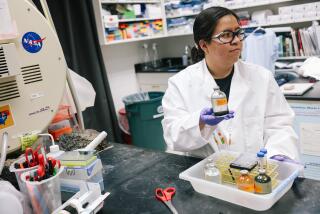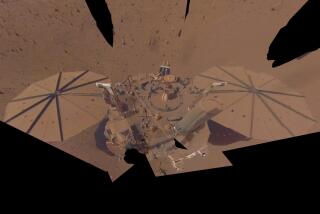Rosetta science: Study suggests water on Earth did not come from comets
After a 10-year journey through the solar system, an epic rendezvous with a speeding comet, and the drama of Philae’s triple landing, the science phase of the Rosetta mission has officially begun.
In a study published Wednesday in the journal Science, researchers working with Rosetta’s ROSINA instrument report that the water being released into space by comet Churyumov-Gerasimenko has a different chemical fingerprint than the water on Earth. This finding leads the authors to conclude that water on Earth probably came from asteroids, rather than comets.
One of the many mysteries that scientists hoped Rosetta would help solve is how our planet came to be flooded with water.
When Earth was born 4.6 billion years ago, it was too hot to sustain liquid water on its surface. Some of Earth’s original water from those early years might have been preserved in its crust and at the poles, but at least some of the water that fills our oceans today probably came from extraterrestrial sources, said Kathrin Altwegg of the University of Bern in Switzerland and the principal investigator on ROSINA.
Researchers have speculated that the majority of the Earth’s water was delivered 800,000 years after its birth during a period known as the “late bombardment.” This was a time when the Earth saw many impacts from comets and asteroids. But which one of them is responsible for bringing water to our planet has been the subject of intense debate.
One way to determine where our water came from is to find other bodies in the solar system with water that has the chemical characteristics as water on Earth.
Here on our planet, about 3 out of every 10,000 molecules of water is what is known as “heavy water.” Instead of being an H20 (two hydrogens and one oxygen), heavy water is an HDO (one hydrogen, one deuterium and one oxygen). Deuterium is an isotope of hydrogen. While hydrogen has one proton and one electron, deuterium has one proton, one electron and one neutron, making it twice as heavy as a regular hydrogen.
Comets have large quantities of water ice in their nucleus, so they may seem the obvious vehicle for water delivery on Earth. But 30 years ago, researchers discovered that comet Halley, which hails from the Oort cloud at the edge of our solar system, has twice the amount of heavy water. In other words, the fingerprints on the two reservoirs of water did not match.
“This was quite surprising at the time, and it ruled out Oort cloud comets as the source of our terrestrial water,” Altwegg said at a news conference Tuesday.
In 2011, researchers looked at the ratio of HDO to H20 in a comet called Hartley 2 that originated in the Kuiper Belt, out by the orbit of Pluto. To the science team’s surprise, it was a direct match with the water on Earth. This led to a new hypothesis: Perhaps the water on Earth came from Kuiper Belt comets.
Comet Churyumov-Gerasimenko is also a Kuiper Belt comet, but according to data collected by a mass spectrometer on the ROSINA instrument, it has an even higher ratio of HDO to H20 than comet Halley.
“It is probably one of the highest ever measured,” Altwegg said.
She explained that this finding has lots of interesting implications. It suggests that comets in the Kuiper Belt can vary widely. It also suggests that Kuiper Belt comets were not responsible for bringing water to Earth.
“Even if you had a mixture of Hartley 2s and Churyumov-Gerasimenkos, that would bring your deuterium immediately over what we have here on Earth,” Altwegg said. “Because Churyumov-Gerasimenko is so high, you would only need a fraction of comets like it to spoil the Hartley 2 results.”
In light of ROSINA’s findings, Altwegg thinks it is more likely that asteroids were responsible for bringing water to Earth. Meteorites, which are fragments of asteroids that have fallen to Earth, generally have a similar ratio of deuterium as our terrestrial water.
She also explained that earlier in the history of the solar system, asteroids probably carried more water with them than they do now.
During the news conference, Altwegg was asked how she felt about the findings. Was she surprised or disappointed that Rosetta did not find that comets brought water to Earth?
No way.
“I think it is very nice to see the diversity we have in the Kuiper Belt, and to see that not everything is as simple as it seemed,” she said. “Just to confirm a measurement would not be as exciting as getting a whole new result.”
Right on!
Science rules! Follow me @DeborahNetburn and “like” Los Angeles Times Science & Health on Facebook.







